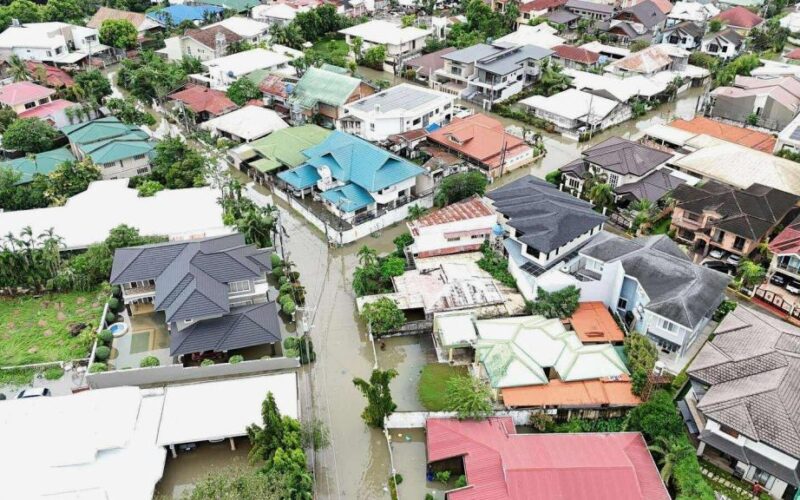By JIM GOMEZ, Associated Press
MANILA, Philippines (AP) — Typhoon Kalmaegi has left at least 26 people dead in the Philippines, mostly in flooding set off by the storm, which barreled across the central part of the country on Tuesday, disaster response officials said. Floodwaters trapped scores of people on their roofs and submerged cars.
A Philippine air force helicopter with five personnel on board crashed in a separate incident in southern Agusan del Sur province while flying to help provide humanitarian assistance to provinces battered by Kalmaegi.
The Super Huey chopper crashed near Loreto town and efforts were underway to locate the air force personnel aboard, the military’s Eastern Mindanao Command said in a statement.
Military officials didn’t immediately provide other details about the crash, including the condition of the five air force personnel aboard and what could have caused the crash.
Kalmaegi was last spotted over the coastal waters of Jordan town in the central province of Guimaras with sustained winds of 81 mph and gusts of up to 112 mph. It was forecast to blow away into the South China Sea late Tuesday or early Wednesday after hitting the western province of Palawan.
Bernardo Rafaelito Alejandro IV, deputy administrator of the Office of Civil Defense, said that at least 26 people were reported killed — many in flooding in Cebu province and other central island provinces pummeled by Kalmaegi, the 20th tropical cyclone to batter the Philippine archipelago this year. Details of those typhoon deaths were still being verified, he said.
Among the dead was an older villager, who drowned in floodwaters in Southern Leyte, where a province-wide power outage was reported after the typhoon made landfall around midnight in one of its eastern towns. A resident died after being hit by a fallen tree in central Bohol province, provincial officials said.
Gwendolyn Pang, secretary-general of the Philippine Red Cross, said that an unspecified number of residents were trapped on their roofs by floodwaters in the coastal town of Liloan in Cebu, and added that cars either were submerged in floods or floated in another Cebu community.
“We have received so many calls from people asking us to rescue them from roofs and from their houses, but it’s impossible,” Pang told The Associated Press on Tuesday morning. “There are so many debris, you see cars floating so we have to wait for the flood to subside.”
Cebu province was still recovering from a 6.9 magnitude earthquake on Sept. 30 that left at least 79 people dead and displaced thousands when houses collapsed or were severely damaged.
In Eastern Samar, one of the east-central provinces first lashed by Kalmaegi early Tuesday, fierce wind either ripped off roofs or damaged about 300 mostly rural shanties on the island community of Homonhon, which is part of the town of Guiuan, but there were no reported deaths or injuries, Mayor Annaliza Gonzales Kwan said.
“There was no flooding at all, but just strong wind,” Kwan told the AP by telephone. “We’re OK. We’ll make this through. We’ve been through a lot, and bigger than this.”
In November 2013, Typhoon Haiyan, one of the most powerful tropical cyclones on record, slammed ashore into Guiuan. it then raked across the central Philippines, leaving more than 7,300 people dead or missing, flattening entire villages and sweeping scores of ships inland. Haiyan demolished about 1 million houses and displaced more than 4 million people in one of the country’s poorest regions.
Before the typhoon’s landfall, officials said that more than 387,000 people had evacuated to safer ground in eastern and central Philippine provinces. Authorities warned of torrential rains, potentially destructive winds and storm surges of nearly 10 feet.
Interisland ferries and fishing boats were prohibited from venturing into increasingly rough seas, stranding more than 3,500 passengers and cargo truck drivers in nearly 100 seaports, the coast guard said. At least 186 domestic flights were canceled.
The Philippines is battered by about 20 typhoons and storms each year. The country also is often hit by earthquakes and has more than a dozen active volcanoes, making it one of the world’s most disaster-prone countries.
Joeal Calupitan and Aaron Favila contributed to this report.














